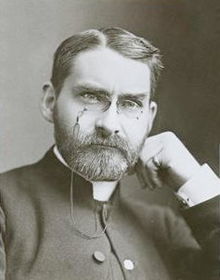Hugh Price Hughes
|
The Reverend Hugh Price Hughes |
|
|---|---|
 |
|
| Born |
9 February 1847 Carmarthen, Wales |
| Died | 17 November 1902 (aged 55) London |
| Nationality | British |
| Church | Wesleyan Methodist Church |
|
Offices held
|
Superintendent of the West London Methodist Mission, President of the Wesleyan Methodist Conference (1898/99) |
Hugh Price Hughes (9 February 1847 – 17 November 1902) was a Welsh Protestant clergyman and religious reformer in the Methodist tradition. He served in multiple leadership roles in the Wesleyan Methodist Church. He organised the West London Methodist Mission, a key Methodist organisation today. Recognised as one of the greatest orators of his era, Hughes also founded and edited an influential newspaper, the Methodist Times in 1885. His editorials helped convince Methodists to break their longstanding support for the Conservatives and support the more moralistic Liberal Party, which other Nonconformist Protestants were already supporting.
Hughes was born in Carmarthen, and was educated at Richmond Theological College and University College London. He married Katherine Hughes (née Barrett). In 1885, he founded the Methodist Times, and in 1887 he was appointed Superintendent of the West London Methodist Mission. His wife Katherine organised and led the innovative Sisters of the People, social work volunteers attached to the West London Mission. In 1896, he was elected first president of the National Council of Evangelical Free Churches, an organisation he helped create. In 1898, he was elected President of the Wesleyan Methodist Conference for a year-long term. He died at his home in London following a stroke.
Hughes rose as the leader of the "Forward Movement" in Methodism, which sought to reshape the Methodist Church as the moral and social conscience of Britain. Later, he extended this idea to the Nonconformist Free Churches as a whole. He was concerned that the non-Anglican evangelical tradition had become overly focused on individual salvation, and it was time for Methodists, Baptists, Congregationalists, Presbyterians and Quakers to become churches in a fuller sense, taking on responsibility for the salvation of society. These ideas were expressed in his published sermons. In his first book of sermons, entitled Social Christianity, he declared "It is because the spirit of Christ has not been introduced into public life that Europe is in a perilous condition today. . . My wish is to apply Christianity to every aspect of life."
...
Wikipedia
